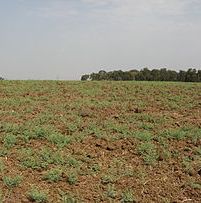Zionists Angry Over Orthodox Willingness to Trade With Gaza
The Zionist Minister of Agriculture, Shalom Simchon, met with National Religious Party leaders earlier this week, and launched an attack on the ultra-Orthodox establishment, saying they had "declared a cultural war on Israel" and "attempted to yield profit on the back of ordinary citizens."
He referred to the issue of Shmittah, the current Jewish sabbatical year, during which Torah law prohibits the working of the Holy Land and sale of its produce, unless the land is owned by a non-Jew.
For decades, the Zionist Chief Rabbinate and the local rabbinates of most major cities have allowed farmers to symbolically sell their land to a non-Jew for the year on the eve of Rosh Hashanah, then buy it back at the year's end. Ultra-Orthodox rabbis independent of the Zionists disapproved of this loophole, and gave their certification only to produce grown on land genuinely owned by non-Jews. But at least a major part of Jewish-grown produce had the Zionist Rabbinate's certification.
This year, however, the Chief Rabbinate allowed local rabbinates to determine their own policy on this question. Rabbinates with ultra-Orthodox leanings began revoking the kosher certification of farmers who took advantage of the loophole. As a result, Jewish traders signed agreements with Gaza farmers to supply thousands of tons of vegetables during the current sabbatical year.
Subsequently, the Zionist government enacted a trade embargo as part of restrictive measures against the Hamas government in Gaza. The High Court of Justice is preparing to review Wednesday five petitions by ultra-Orthodox traders against the ban on trading with Gaza during this sabbatical year.
At the same time, Palestinian Authority Agriculture Minister Mahmoud Habash has approached Shalom Simchon through a third party, requesting him to revoke Israel's embargo on importing farming produce from Gaza.
The Agriculture Ministry said that Simchon may meet with Habash in the next few days to discuss his request. Earlier this week, Simchon announced he did not intend to change the ministerial directives preventing imports of agricultural produce.
Simchon fiercely criticized the ultra-Orthodox rabbis, and urged the NRP to join his initiative to amend the Chief Rabbinate law to enable nonaligned rabbis to grant kosher certification to agricultural produce which had been disqualified by ultra-Orthodox rabbis.
Simchon said that the problem goes beyond the substantial losses to the industry (NIS 2 billion, according to the Agriculture Ministry figures) and the steep rise in retail prices.
The NRP leaders told Simchon that they would back his efforts to forestall outstanding imports as long as the Chief Rabbinate refuses to grant Kashrut certificates to businesses and institutions that buy local agricultural produce from farmers who had obtained a special permit.

This is an example of the religious Zionists putting their political agenda the strangling of Gaza's economy before Jewish halachic considerations. True religious Jews, on the other hand, simply want to keep Torah law in the best possible way, and have no political motives. On the contrary, the Torah tradition has always obligated Jews to be on the best of terms with their non-Jewish neighbors. Throughout the Middle East and especially in Palestine, relations were good before the advent of Zionism.
It would be instructive to note one historical incident: In the 1920's, someone once approached Rabbi Yosef Chaim Zonenfeld and asked him to write a letter forbidding people to purchase esrogim (citrons, a fruit required for the Jewish festival of Sukkos) from Arabs, in order to help struggling Jewish farmers. But Rabbi Zonenfeld was concerned about damage to Jewish-Arab relations, and refused to write the letter (Mara Dara Yisroel v. 1, p. 145).